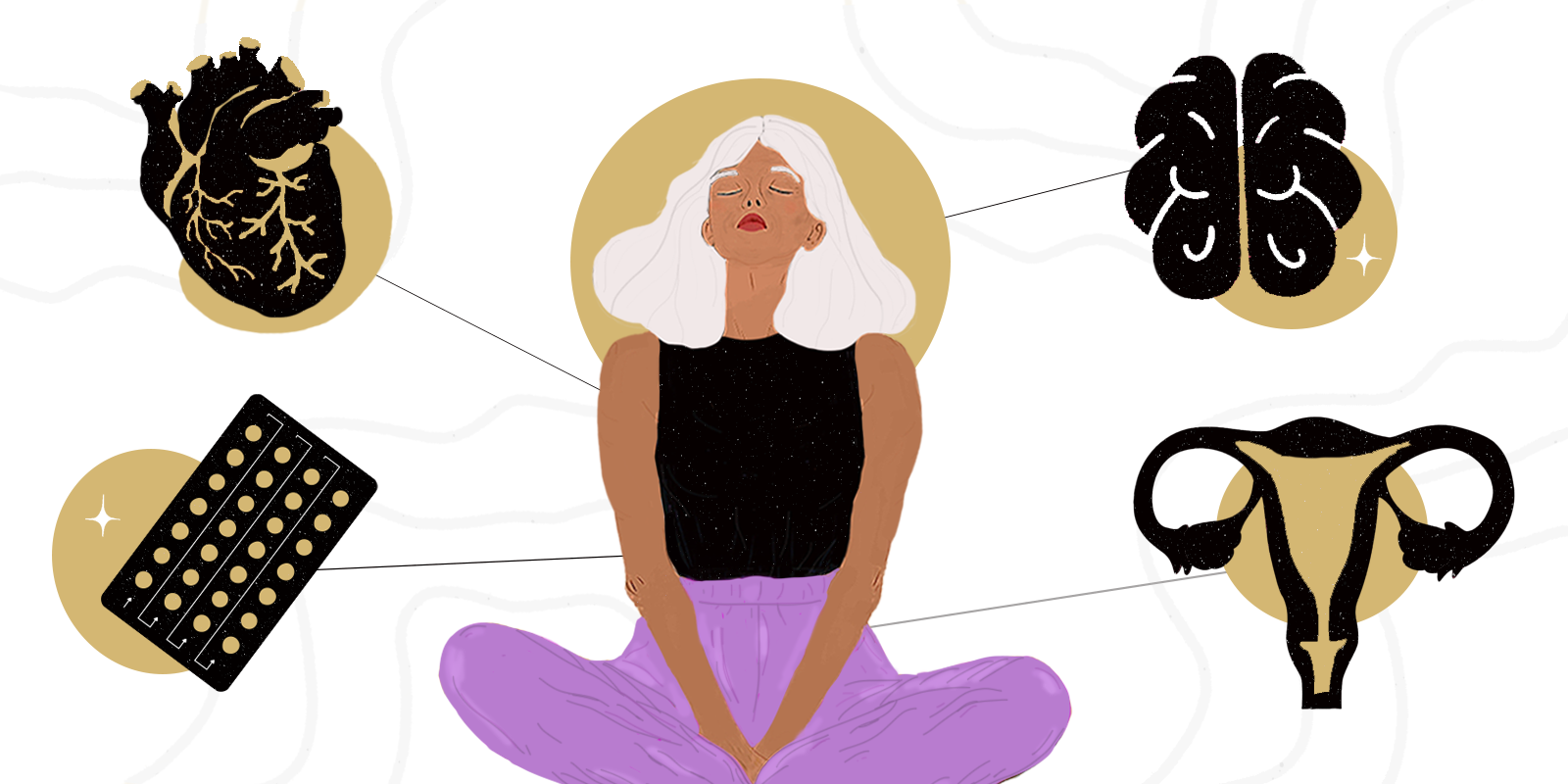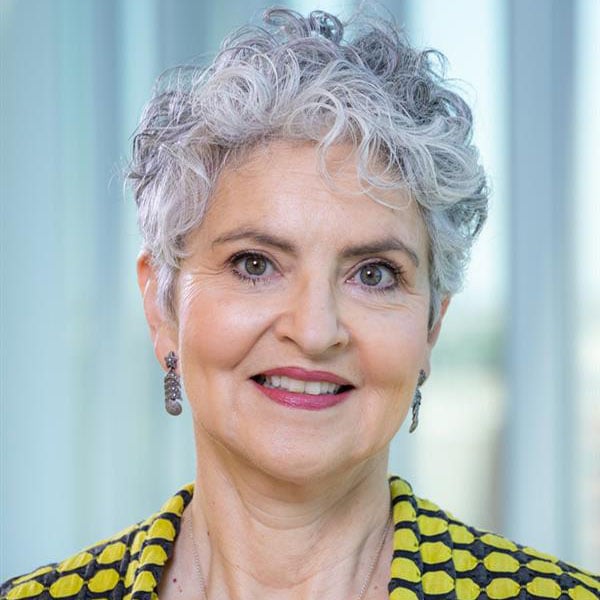-
Menopause is a multi-phase process
The term “menopause” technically refers to the point at which a woman has not had a period for 12 consecutive months. It is bracketed by perimenopause and postmenopause.
Perimenopause typically starts in a woman’s 40s, with the median age being 47. During this time, estrogen and progesterone levels start to fluctuate, and periods become irregular. The number of eggs a woman has also begins to decrease dramatically. Female babies are born with approximately 300,000 to 1.2 million eggs, a number that starts to decline right after birth. At perimenopause, the number is roughly in the low thousands. “When the eggs reach a certain critical level, there's a break in menstrual cyclicity,” Santoro said.
The sharpest decline in estrogen comes during what Santoro calls the “late menopausal transition,” which starts when a woman has gone 60 days without a period and ends when 364 days have passed. On day 365, she officially enters menopause. At this point, the ovaries have stopped releasing eggs, and estrogen production has significantly declined. Most women (95%) will reach menopause between the ages of 45 to 54, with the average age being between 51 and 52. From then on, women are considered postmenopausal.
-
There are a wide range of symptoms
Hot flashes, night sweats and sleeplessness are commonly associated with menopause. “These are the biggest drivers that bring women to a clinician for treatment,” Santoro said. Other symptoms may include vaginal dryness, dry skin and “brain fog.”
Hormonal changes during menopause can also affect mental health. Women may experience irritability, increased anxiety and mood changes. “The risk for major depression is at its highest for women when they reach that late transition, when they go 60 days without a menstrual period,” Santoro said. “It can be hard to figure out. You may notice aches and pains. You may feel exhausted. You may have no appetite, or you may be eating too much. You may be sleeping too much or too little. It’s important to talk to your doctor.”
-
It's not a one-size-fits-all experience
It’s not clear why some women have more severe symptoms than others or what influences when perimenopause will start and how long the transition to menopause will last.
“Some women have difficult symptoms very soon after their first period irregularity, but they only last for, say, a year, and then they’re in menopause,” said Joshua Johnson, PhD, an associate professor of obstetrics and gynecology. “Other women might have irregular periods for up to nine years, but not too many or too disruptive symptoms.”
Genes, race and socioeconomic status are thought to contribute to fluctuations in menopause experiences, and patterns exist within families and among women who are related to one another. “The timing can be similar between you and your sisters or mother and aunts, but not necessarily,” Johnson said.
-
It affects other body systems
Menopause affects more than a woman’s reproductive system. As estrogen declines, bone density diminishes, cardiovascular risks increase and body composition changes. Women lose 6% to 7% of their skeleton during the perimenopausal years and about 6% of their lean muscle is replaced by fat. On average, women will put on two pounds per year during menopause.
“By the time they hit the late menopause transition, women should have a thorough checkup,” Santoro said. “Have your lipids checked, have your thyroid checked, have your blood sugar checked and get screened for diabetes.”
-
Symptoms are treatable
The use of hormonal therapies to treat the most bothersome symptoms of menopause – hot flashes and night sweats in particular – has been controversial, but the thinking is changing, especially now that there are newer formulations and options for women with certain health issues.
In 2002, Women’s Health Initiative (WHI) studies suggested that hormonal therapies might increase the risk of breast cancer, but “the concept that hormones were dangerous was always wrong,” said Santoro. “In fact, they can be beneficial for women in the 50 to 59 age group. The data from the WHI was just widely misapplied and misinterpreted. Now there's a little more relaxation and a more balanced interpretation.”
For women who can’t take or prefer not to take hormones, there is now a Food and Drug Administration-approved non-hormonal treatment for hot flashes called Veozah (fezolinetant) that Santoro studied. The oral medication works by binding to and blocking the neurokinin 3 receptor (NK3R), which plays a role in the brain’s regulation of body temperature.
Santoro cautions women to be skeptical of people hawking so-called menopause cures on social media. “People promise relief with all kinds of wacky stuff that is not based on science. There are a lot of things out there that sound like they're too good to be true, and they probably are.”
-
Delaying menopause: possible but controversial
Given how disruptive the symptoms of menopause can be and its deleterious effects on a woman’s overall health, one might wonder if modern medicine could figure out a way to prevent menopause entirely, or at least delay it.
“If you, as a young woman, surgically had a portion of your ovary removed and you froze that tissue, you're putting a pause button on that piece of tissue,” said Johnson, who has done research in this area. “If you put that tissue back as you approach menopause, the tissue will have many more follicles (fluid-filled sacs that contain eggs) remaining and would be likely to delay menopause.”
Johnson acknowledged that the prospect of having periods for the rest of their lives is unlikely to appeal to most women. “There are trade-offs to consider where continuing menstrual cycles could mean stronger bones and reduced symptoms,” he said.
For women who experience premature menopause (due to chemotherapy or total hysterectomy, for example), it may make sense to try these sorts of therapies, Santoro said. “But for the average woman to try to delay her menopause or make it go away, there are probably consequences to that continued exposure to her own hormones.”
Accepting menopause as a natural process is essential, but there’s no need to muddle through without help, Santoro said. “There’s a school of thought that this is a natural thing, and we should embrace it, but nature is not always so kind,” she said.
“If nature decides to keep you up for a week with ridiculous hot flashes and you've got a big business presentation, that's not a good feeling. So, we need to find a happy medium where symptoms get treated,” Santoro said. “Recognizing what the symptoms are and attending to your health needs is important. Most women can be gotten through this transition with minimal grief and misery.”
Guest Contributor: Christina Frank is a Brooklyn-based writer who specializes in health and medicine.





